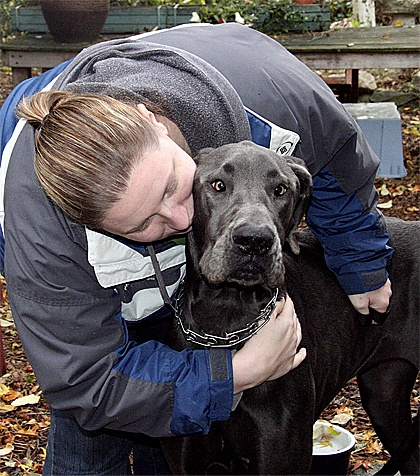A plan to close the King County Animal Shelter has local cities and animal advocates wondering what will happen to pets without a home after the Jan. 31, 2010, deadline.
The King County Council voted Nov. 3 to shutter shelters in Kent and Crossroads, citing audits criticism management problems and a chaotic work environment. The county will stop providing animal control services to all cities by June 30, 2010, unless new agreements are made allowing the county to recover the full costs of field services.
Closing the shelters would save the cash-strapped county, struggling with a $56 million deficit, about $1.5 million annually.
The county is not required to provide animal services by law, County Councilwoman Kathy Lambert told the Valley Record. The budget shortfall means the county must focus on required services, she said.
The council seeks to transition shelter animals to providers who can demonstrate the ability to run a model animal welfare program. Talks between the county and Seattle Humane Society are under way.
However, Nancy McKenney, interim manager of King County Animal Care and Control, said she is concerned about where animals will go if the shelter closes in January, given the quick turnaround. With the amount of effort that Animal Care provides for public education and around-the-clock response, McKenney feels the county is ambitious in its timeline to transition the department by next year.
“Most people don’t understand that our animal control personnel do a lot,” McKenney said. “They do night duty, picking up loose livestock, dead animals on the roadway because no one else will, and investigate pet owners and pet cruelty.”
Last year, the county took in about 10,000 animals.
Kim Howard, operator of Three Rivers Rescue in Snoqualmie, has provided shelter to homeless animals for 16 years. A self-proclaimed animal activist, she has worked closely with Animal Care, and said she has witnessed the huge number of animals that county staff take responsibility for each day.
“The people saying King County is bad and is not treating animals right, they need to spend a day there and walk in their shoes,” Howard said.
Even the most kind-hearted people who work in the animal care industry can be overwhelmed, Howard said.
Euthanasia rate
In 2008, the county placed about 6,000 dogs and cats into new homes. That year, Animal Care promoted “Pet of the Week” listings and adoption events, helping foster families take animals into their homes.
But not all pets find new homes. Last year, 2,182 animals, roughly 20 percent of all brought to the county, were euthanized.
Animals are usually euthanized due to aggressive temperament, which makes them difficult to find new homes, or because they are suffering from severe health problems.
“It’s never to make more space,” McKenney said. Sometimes, putting an animal down is a mercy.
Howard understands that the county shelter has taken criticism for its euthanasia policy.
However, she has witnessed that there aren’t enough adoptive homes.
“I’ve seen dogs kept in kennels for years,” Howard said. “The fact is that those dogs are pretty unhappy,” living out their lives in a concrete cell.
In times of recession, it can be difficult for families to care for themselves as well as a pet. Howard said she’s seen plenty of owners release pets to a shelter because they’ve become too much to handle or a financial burdens.
“It’s a disposable society — easy to come by, easy to get rid of,” she said.
Howard said she doesn’t understand why animals and shelters have to take the brunt of a family’s rash decision.
New direction?
With the shelter closure looming, there has been little consideration for what Valley cities will do to fill the gap if the county shelter closes. The county has yet to present a new plan or cost recovery model to the cities.
“There certainly hasn’t been any discussion between the county and the cities, regarding stepping up,” said Snoqualmie councilman Bob Jeans, chairman of the city’s public safety committee.
Talks are underway on continuing county services, but for more than just license fees, said North Bend City Administrator Duncan Wilson.
If a new contract is not established, North Bend will have to come up with a new way to do animal control, either on its own, or contracting privately with multiple cities.
Jeans and Snoqualmie Police Chief Jim Schaffer visited the Kent shelter two years ago, following a dog attack in Snoqualmie. Jeans said he came away from that meeting with county staff with a feeling of respect for the shelter staff.
The shuttering of the shelter, he said, would be “a real loss” to the communities who rely on it.
Animal Care hopes to provide guidance at the county’s planning table, McKenney said, to ensure that the decision will better service animals and people.
“Nothing has been confirmed yet,” she said. “And with the new executive, everything can potentially change.”



